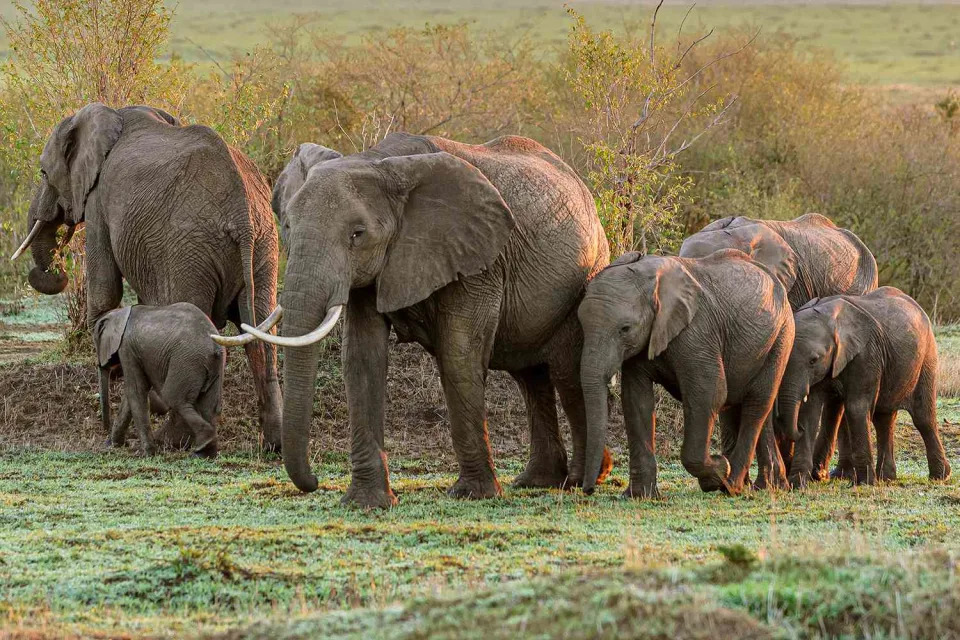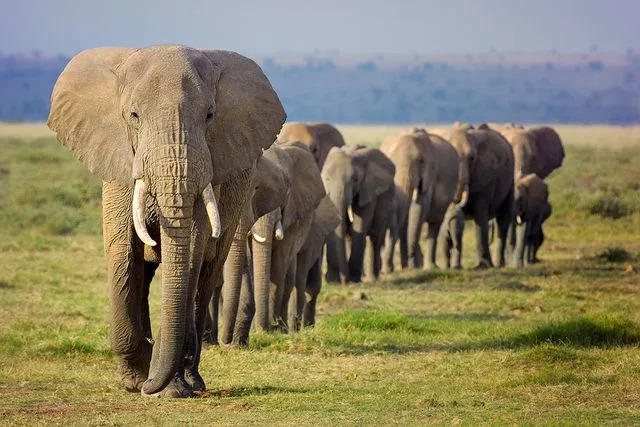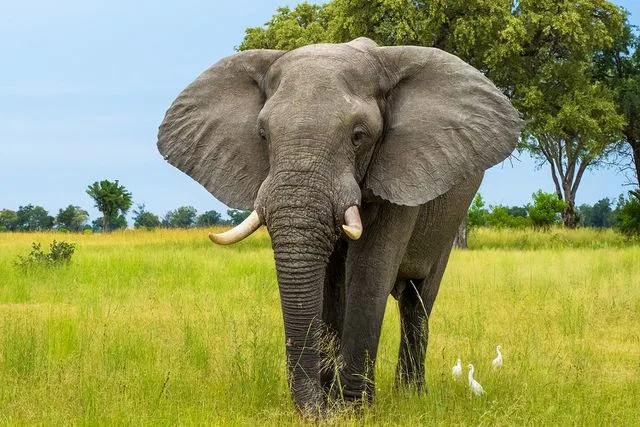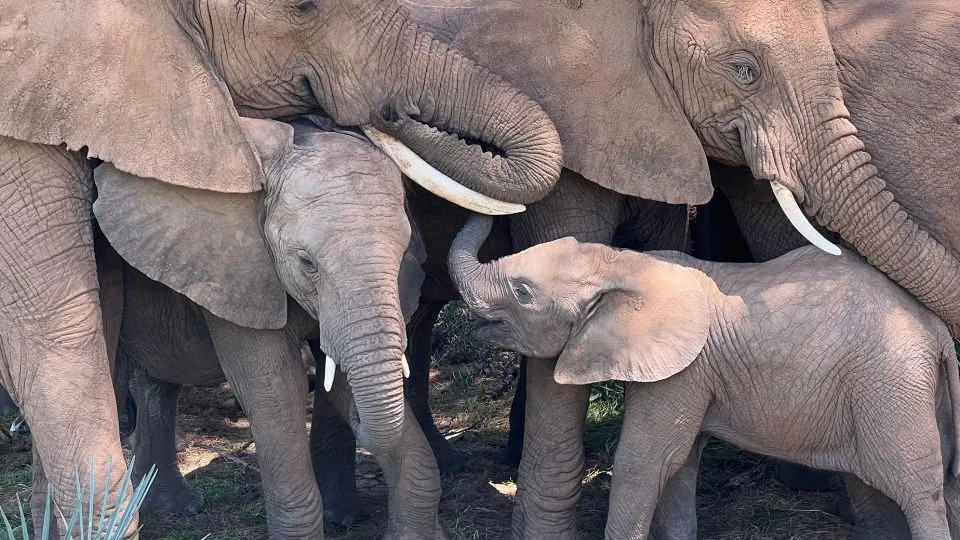According to a new study published on Monday, June 10, African elephants refer to one another with "individually specific calls"

Getty
African Elephants walking across the savanna of the Massai Mara, Kenya
Gabrielle Rockson
Gabrielle Rockson
PEOPLE
Tue, June 11, 2024
Humans aren't the only animals to use names.
According to a new study published in Nature Ecology & Evolution on Monday, June 10, African elephants also refer to one another through unique sounds.
Per NBC News, the study found that elephants can hear their names over long distances across the savanna when they speak to one another using low rumbles.
The research also discovered that the elephants learn to recognize and address their mates using their names instead of just imitating sounds.
“Here we present evidence that wild African elephants address one another with individually specific calls, probably without relying on imitation of the receiver,” the study abstract read.
Never miss a story — sign up for PEOPLE's free daily newsletter to stay up-to-date on the best of what PEOPLE has to offer, from juicy celebrity news to compelling human interest stories.

Getty A family or herd of African Elephants marching in line at Amboseli National Park, Kenya
Related: Alligator Wrestling Tourist Attractions Hurting Not Helping Gator Conservation, Study Finds
To get the results, the study used “machine learning to demonstrate that the receiver of a call could be predicted from the call’s acoustic structure, regardless of how similar the call was to the receiver’s vocalizations,” adds the abstract.
The PEOPLE Puzzler crossword is here! How quickly can you solve it? Play now!
Scientists achieved this by following a herd of elephants in jeeps at Kenya’s Samburu National Reserve and Amboseli National Park, to closely observe the animals who called out and the ones who responded.
"We've had several incidents where we've been with these elephants and the matriarch of the family will give a call, and everyone in the family will answer,” co-author and Colorado State University ecologist George Wittemyer, said per ITV News.
"Then several seconds later, she'll give seemingly a very similar call and nobody in the family would answer except one individual."

Henrik Karlsson/GettyAn African savanna elephant
According to ITV News and NBC News, researchers then played recordings of the names to individual elephants and disovered that the animals responded more energetically by flapping their ears and lifting their trunks whenever they heard their own noises.
“Just like humans, elephants use names, but probably don’t use names in the majority of utterances, so we wouldn’t expect 100%,” study author and Cornell University biologist Mickey Pardo said, per NBC News.
Moreover, scientists say that animals with complex social structures and family groups are more likely to use individual names as it helps them reunite after a separation.
“If you’re looking after a large family, you’ve got to be able to say, ‘Hey, Virginia, get over here!’ ” Duke University ecologist Stuart Pimm, who was not involved in the study, told NBC News.
“Elephants are incredibly social, always talking and touching each other — this naming is probably one of the things that underpins their ability to communicate to individuals,” Wittemyer added, per the outlet. “We just cracked open the door a bit to the elephant mind.”

African elephants use names to call each other, study suggests
Tue, June 11, 2024
Humans aren't the only animals to use names.
According to a new study published in Nature Ecology & Evolution on Monday, June 10, African elephants also refer to one another through unique sounds.
Per NBC News, the study found that elephants can hear their names over long distances across the savanna when they speak to one another using low rumbles.
The research also discovered that the elephants learn to recognize and address their mates using their names instead of just imitating sounds.
“Here we present evidence that wild African elephants address one another with individually specific calls, probably without relying on imitation of the receiver,” the study abstract read.
Never miss a story — sign up for PEOPLE's free daily newsletter to stay up-to-date on the best of what PEOPLE has to offer, from juicy celebrity news to compelling human interest stories.

Getty A family or herd of African Elephants marching in line at Amboseli National Park, Kenya
Related: Alligator Wrestling Tourist Attractions Hurting Not Helping Gator Conservation, Study Finds
To get the results, the study used “machine learning to demonstrate that the receiver of a call could be predicted from the call’s acoustic structure, regardless of how similar the call was to the receiver’s vocalizations,” adds the abstract.
The PEOPLE Puzzler crossword is here! How quickly can you solve it? Play now!
Scientists achieved this by following a herd of elephants in jeeps at Kenya’s Samburu National Reserve and Amboseli National Park, to closely observe the animals who called out and the ones who responded.
"We've had several incidents where we've been with these elephants and the matriarch of the family will give a call, and everyone in the family will answer,” co-author and Colorado State University ecologist George Wittemyer, said per ITV News.
"Then several seconds later, she'll give seemingly a very similar call and nobody in the family would answer except one individual."

Henrik Karlsson/GettyAn African savanna elephant
According to ITV News and NBC News, researchers then played recordings of the names to individual elephants and disovered that the animals responded more energetically by flapping their ears and lifting their trunks whenever they heard their own noises.
“Just like humans, elephants use names, but probably don’t use names in the majority of utterances, so we wouldn’t expect 100%,” study author and Cornell University biologist Mickey Pardo said, per NBC News.
Moreover, scientists say that animals with complex social structures and family groups are more likely to use individual names as it helps them reunite after a separation.
“If you’re looking after a large family, you’ve got to be able to say, ‘Hey, Virginia, get over here!’ ” Duke University ecologist Stuart Pimm, who was not involved in the study, told NBC News.
“Elephants are incredibly social, always talking and touching each other — this naming is probably one of the things that underpins their ability to communicate to individuals,” Wittemyer added, per the outlet. “We just cracked open the door a bit to the elephant mind.”

African elephants use names to call each other, study suggests
Amarachi Orie, CNN
Mon, June 10, 2024 at 8:09 p.m. MDT·6 min read
Wild African elephants may address each other using individualized calls that resemble the personal names used by humans, a new study suggests.
While dolphins are known to call one another by mimicking the signature whistle of the dolphin they want to address, and parrots have been found to address each other in a similar way, African elephants in Kenya may go a step further in identifying one another.
These elephants learn, recognize and use individualized name-like calls to address others of their kind, seemingly without using imitation, according to the study published Monday in the journal Nature Ecology and Evolution.
The most common type of elephant call is a rumble, of which there are three sub-categories. So-called contact rumbles are used to call another elephant that is far away or out of sight. Greeting rumbles are used when another elephant is within touching distance. Caregiver rumbles are used by an adolescent or adult female toward a calf she is caring for, according to the study.
The researchers looked at these three types of rumbles, using a machine-learning model to analyze recordings of 469 calls made by wild groups of females and calves in Amboseli National Park and Samburu and Buffalo Springs National Reserves between 1986 and 2022. All the elephants could be individually identified by the shape of their ears, as they had been monitored continuously for decades, according to the study.
The idea was that “if the calls contained something like a name, then you should be able to figure out who the call was addressed to just from the acoustic features of the call itself,” said lead study author Mickey Pardo, an animal behaviorist and postdoctoral fellow at Cornell University in New York.
The researchers found that the acoustic structure of calls varied depending on who the target of the call was.
The machine-learning model correctly identified the recipient of 27.5% of calls analyzed, “which may not sound like that much, but it was significantly more than what the model would have been able to do if we had just fed it random data,” Pardo told CNN.
“So that suggests that there’s something in the calls that’s allowing the model to identify who the intended receiver of the call was,” he added.

An elephant family comforts a calf while napping under a tree in Samburu National Reserve, Kenya. - George Wittemyer
Call and response
The researchers also found that the elephants probably weren’t just mimicking the voice of the individual they were addressing. By comparing pairs of calls between callers and receivers, as well as the receivers’ calls to other individuals, they discovered that the majority of the calls made by the caller did not sound more like the receiver’s call than when they addressed other individuals, according to the study.
The researchers then played back calls to 17 elephants to see whether they recognized and responded to ones that had originally been directed at them.
They found that the elephants would respond more strongly to a call that was originally addressed to them than to one from the same caller that was originally addressed to someone else. “So that meant that the elephants could tell if a call was meant for them just by hearing that call,” Pardo said.
He added that the study “tells us something about the cognitive abilities of elephants because if elephants are addressing one another in this way, they’re basically coming up with names for each other. That implies some capacity for abstract thought — they have to be able to learn this arbitrary sound and associate it with other individuals and essentially call each other by name.”
Coen Elemans, a professor of bioacoustics at the University of Southern Denmark who was not involved with the study, called the findings “very exciting because the use of names was unknown amongst animals.”
“In some animals, such a parrots and dolphins, individuals can have a specific call that others try to mimic, but that is not equivalent to a human name,” Elemans said.
The evolution of language
Elephants maintain lifelong varied social bonds with many individuals and are often separated from their closely bonded social partners, according to the study.
So, some calls can be used to grab the attention of an individual who is far away, whereas close-distance calls might be used to strengthen social bonds, similar to when humans respond more positively and cooperatively when someone remembers their name, the researchers said.

As several families cross the Ewaso Ngiro River together, a female from the Native Americans family responds to her calf’s distress call. - George Wittemyer
When elephants were close together, caregiving rumbles were more likely to be correctly classified by the machine-learning model than greeting rumbles. The researchers suggested that caregivers may use names more frequently with their calves to either comfort the calf or to help it learn its name.
Calls by adult females were also classified more correctly than calls by juveniles, suggesting that adult females may use names more in their calls because the behavior takes years to develop, according to the study.
Pardo said most mammals are not really capable of learning to produce new sounds — an ability needed in order to label something with a name.
He added that since humans, dolphins and elephants address individuals in their species with something like a name, “the need to name other individuals may have had something to do with the evolution of language.”
“Maybe this pressure of having all these complex social relationships — and you need to be able to address others as individuals — is what led animals, including potentially our own ancestors, to develop this ability to associate new sounds with new things. That sort of could be what led to language,” Pardo continued.
“It would be super interest to investigate if these names are learned. Only very few animal groups are able to imitate sounds, what we call vocal learning,” Elemans said in an email. “We knew some individual elephants could also mimic sounds. Now this study may point towards why vocal learning may also be important; name calling in the wonderfully complex social biology of elephants.”
The study authors were not able to conclusively determine whether different elephants used the same name to refer to the same individual, or if they addressed the same individual with different names.
They also could not determine which aspects of the calls were the name, with calls also having information such as the identity, age, sex and emotional state of the caller encoded in their characteristics, according to the study.
Pardo said he would really like to figure out “how these calls actually contain a name, and I’d be able to isolate the names for specific individuals, and then I think that would open up a lot of other areas of inquiry.”
For more CNN news and newsletters create an account at CNN.com
Scientists used AI to figure out elephants have names for themselves
Grace Eliza Goodwin
BUSINESS INSIDER
Tue, June 11, 2024
Scientists used AI to find elephants likely have unique names for each other.
Machine learning analyzed hundreds of elephant calls recorded in Kenya between 1986 and 2022.
Elephants' ability to recognize name-like calls indicates they may be capable of abstract thought.
Scientists using AI tools have discovered that elephants likely have unique names for each other, according to a new study.
A group of scientists used machine learning to analyze hundreds of wild African elephant calls recorded in Kenya between 1986 and 2022, publishing their findings on Monday in the peer-reviewed journal Nature Ecology and Evolution.
Specifically, the researchers looked at three different types of communication, or "rumbles" between the endangered species of elephants: "contact calling" rumbles when an elephant is calling to another that is more than 50 meters away, "greeting" rumbles when elephants are close to each other, and "caregiving" rumbles when a female elephant is comforting a calf.
They did not analyze other types of rumbles, like "let's go" rumbles, because elephants are less likely to use specific names in that context, the authors explained.
Within each of these types of interactions, the researchers found evidence that elephants address each other with name-like calls specific to each individual — the first time similar behavior has been observed outside humans.
Unlike dolphins and parrots, who address each other by mimicking the receiver's voice, these elephant calls are not imitations of what each elephant sounds like.
They're more abstract, like the names humans use for each other.
That could mean elephants have a capacity for abstract thought greater than we previously understood.
A machine learning model helped the researchers interpret each call's acoustic structure to determine which elephant was being addressed. This wouldn't have been possible without the help of AI, because humans alone aren't able to differentiate elephant rumblings very well, The New York Times reported.
When the researchers replayed a call originally addressed to one elephant, that elephant responded differently than to calls meant for another individual, the researchers explain in the study.
The researchers posted a video to YouTube that shows a mother elephant hearing a playback of her daughter calling to her. When she hears her daughter's call, the mother raises her head and calls back.
"So that meant that the elephants could tell if a call was meant for them just by hearing that call," Mickey Pardo, a lead author on the study, told CNN.
Still, the researchers couldn't identify which part of the call contained the elephant's name, noting that each call is also simultaneously coded with the caller's characteristics, like its age, sex, emotional state, and behavioral context.
Pardo told CNN that the study "tells us something about the cognitive abilities of elephants because if elephants are addressing one another in this way, they're basically coming up with names for each other."
"That implies some capacity for abstract thought," Pardo added. "They have to be able to learn this arbitrary sound and associate it with other individuals and essentially call each other by name."
And if the elephants have names for each other, it's also possible that they have names for other objects too, according to the study's authors.
The authors explained that although they found mixed support for their hypothesis that different elephants use the same name to refer to a fellow elephant, they did find "at least some convergence among different callers addressing the same receiver." And, the authors wrote, it's possible that every elephant within a family uses the same name to address a specific member.
Scientists used AI to find elephants likely have unique names for each other.
Machine learning analyzed hundreds of elephant calls recorded in Kenya between 1986 and 2022.
Elephants' ability to recognize name-like calls indicates they may be capable of abstract thought.
Scientists using AI tools have discovered that elephants likely have unique names for each other, according to a new study.
A group of scientists used machine learning to analyze hundreds of wild African elephant calls recorded in Kenya between 1986 and 2022, publishing their findings on Monday in the peer-reviewed journal Nature Ecology and Evolution.
Specifically, the researchers looked at three different types of communication, or "rumbles" between the endangered species of elephants: "contact calling" rumbles when an elephant is calling to another that is more than 50 meters away, "greeting" rumbles when elephants are close to each other, and "caregiving" rumbles when a female elephant is comforting a calf.
They did not analyze other types of rumbles, like "let's go" rumbles, because elephants are less likely to use specific names in that context, the authors explained.
Within each of these types of interactions, the researchers found evidence that elephants address each other with name-like calls specific to each individual — the first time similar behavior has been observed outside humans.
Unlike dolphins and parrots, who address each other by mimicking the receiver's voice, these elephant calls are not imitations of what each elephant sounds like.
They're more abstract, like the names humans use for each other.
That could mean elephants have a capacity for abstract thought greater than we previously understood.
A machine learning model helped the researchers interpret each call's acoustic structure to determine which elephant was being addressed. This wouldn't have been possible without the help of AI, because humans alone aren't able to differentiate elephant rumblings very well, The New York Times reported.
When the researchers replayed a call originally addressed to one elephant, that elephant responded differently than to calls meant for another individual, the researchers explain in the study.
The researchers posted a video to YouTube that shows a mother elephant hearing a playback of her daughter calling to her. When she hears her daughter's call, the mother raises her head and calls back.
"So that meant that the elephants could tell if a call was meant for them just by hearing that call," Mickey Pardo, a lead author on the study, told CNN.
Still, the researchers couldn't identify which part of the call contained the elephant's name, noting that each call is also simultaneously coded with the caller's characteristics, like its age, sex, emotional state, and behavioral context.
Pardo told CNN that the study "tells us something about the cognitive abilities of elephants because if elephants are addressing one another in this way, they're basically coming up with names for each other."
"That implies some capacity for abstract thought," Pardo added. "They have to be able to learn this arbitrary sound and associate it with other individuals and essentially call each other by name."
And if the elephants have names for each other, it's also possible that they have names for other objects too, according to the study's authors.
The authors explained that although they found mixed support for their hypothesis that different elephants use the same name to refer to a fellow elephant, they did find "at least some convergence among different callers addressing the same receiver." And, the authors wrote, it's possible that every elephant within a family uses the same name to address a specific member.
No comments:
Post a Comment